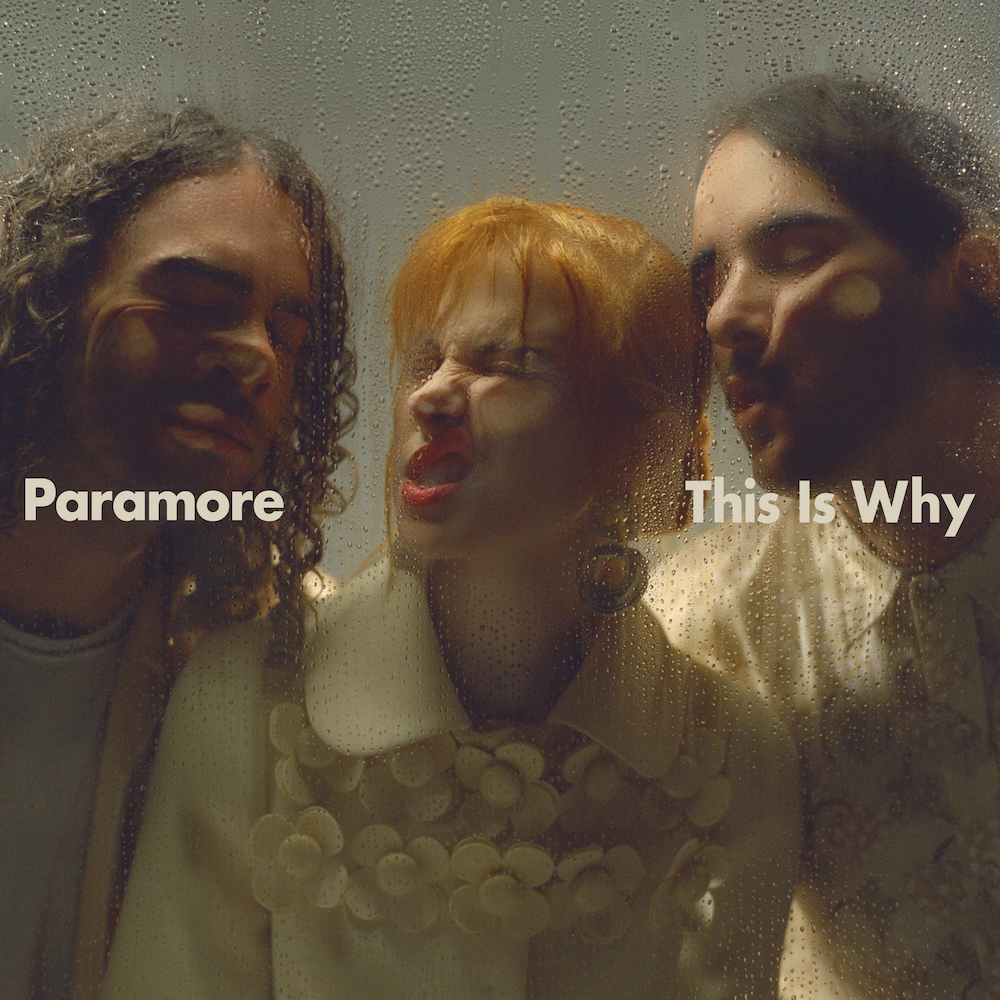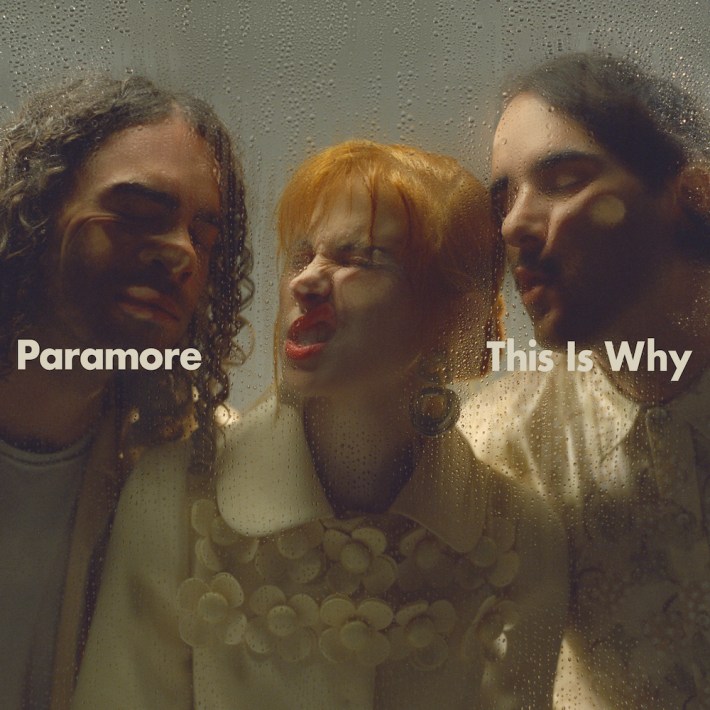- Atlantic
- 2023
At this point in Paramore's two-decade career, the beloved pop-punk/emo band, who have influenced a younger wave of acolytes — from Soccer Mommy to Lil Uzi Vert — are so much more famous than they probably ever imagined possible. The twist? Paramore do not play pop-punk or emo anymore, and they don't have much interest in looking backwards, except to unearth a classic with one of their admirers (see: Billie Eilish getting Hayley Williams to un-retire "Misery Business") or to pause and reflect on how far they've come.
In the sense that they don't currently identify with the Warped Tour scene that birthed them, Paramore have evolved so far past their small-town, Christian-adjacent beginnings that they are actually in great company with their 2023 tourmate, Taylor Swift, who also started releasing music as a teen firmly entrenched in one genre (country) and eventually crossed over to trailblazing pop. After Williams sung the hook on B.o.B's 2010 pop-rap smash "Airplanes," Paramore's self-titled 2013 album spun off poppy singles like "Still Into You" and the gospel-inflected "Ain't It Fun," still the band's only top-10 hit. But the real sonic pivot took place when the trio hit their late 20s on 2017's After Laughter, an album informed by new wave and afropop more so than anything from the MySpace era. Swift and Paramore each find inspiration in myriad genres and experiences, and both acts let their music grow alongside them. Neither are beholden to trends in music or pop culture – they are the trend-setters.
In a punch of irony, the very year Paramore adopted a power-pop bounce on After Laughter saw the rise of younger artists who'd grown up listening to albums like 2007's Riot! and 2009’s Brand New Eyes: Soccer Mommy, Snail Mail, Billie Eilish, and then later Olivia Rodrigo, WILLOW, and girl in red. Young female-identifying artists will always face an uphill battle in the music industry (particularly if they are of color or don’t come from well-off families), but the newer names have experienced "emo" itself very differently than Williams. In the beginning, the flame-haired Paramore singer faced a wall of emo-and-punk-scene misogyny and was frequently the only woman in a sea of men wherever she went.
In the years since, Williams has talked about her various coping mechanisms. "Anger was my medium for a long time," Williams told Vulture in 2020. "When it comes to what's underneath that anger, that shit is so scary." One thing she did not do was gatekeep or talk about supporting women and minorities without actually living up to her word (you would be amazed at how many people in every industry don’t practice what they claim to believe in); Williams has frequently invited female and LGBTQ+ artists — including Jay Som, Tegan And Sara, Charli XCX, and Julien Baker — on the road with Paramore.
Additionally, when emo-era Paramore exploded the amps with soul-bearing, genre-defining songs like "crushcrushcrush" and "Misery Business," you never got the sense that they were pandering or copy-pasting from another band. Paramore were (and are) earnest — they just made the music they wanted to hear. It doesn’t matter what age or era they’re in — their sincerity is the throughline.
Six years after After Laughter, Hayley Williams, Zac Farro, and Taylor York are a long, long way from their precocious, infighting teenage selves. The bandmates are in their 30s, and emo is no longer a punchline but an aesthetic: aspirational, vintage-cool, and elastic in meaning. Paramore, like My Chemical Romance and Avril Lavigne (or pretty much any '00s punk/emo act), could easily capitalize on emo's relevance in the 2020s. But if they did, they wouldn't be Paramore.
Instead, you can always count on Paramore to talk about what's on their minds. Produced by longtime studio collaborator Carlos de la Garza, new album This Is Why forgoes the youthful angst of their early work and the divorce reckoning of After Laughter (the album largely dealt with Williams’ split from New Found Glory’s Chad Gilbert) for prescient matters like headline overconsumption ("The News"), living in a post-truth world where politics are drawn like battle lines (“This Is Why), and existing as part of the burnout generation amid "the planet dying," as Williams has explained "Running Out Of Time."
"I look at the internet, the news, and it feels like [we’re in] Lord Of The Flies," Williams recently told the Guardian about the subject matter within This Is Why. "When I was writing the lyrics, I was like, this social experiment – the internet – has been going wrong since day one. It exposes and exploits the general population’s blatant disregard for nuance… Some days I feel so over it, almost to the point of apathy. But that's the struggle – that you have to fight."
Williams was an early adopter of the internet and social media (Paramore were a pivotal MySpace band), so you can understand the fatigue. In 2021, she announced she would no longer be using any social media to connect with fans in order to create healthier boundaries. "Connection is and always will be a part of my job (thankfully). As for my own personal experience with social media, I just don't want it anymore," she wrote at the time on Instagram. "I've carefully considered this decision for almost a year now. Now I know for sure that my desire to move away from personal accounts (yes, even my finsta) is based on nothing more than my interest in keeping a boundary between a public and private life…and wanting to spend more time looking up and out, rather than down."
That headspace frequently comes to bear on the new album. On the surface, This Is Why mirrors what's happening outside your door, but it goes deeper by considering the way we internalize them — particularly when we carry around portals to an endless thrum of voices shouting opinions into the void. One of my favorite cuts on This Is Why does not so much deal with politics as it does with that little brain-tug that on-repeat says you could be fitter, happier, more productive. "Said I was gonna take some flowers to my neighbor, but I/ Ran out of time/ Didn't wanna show up to the part empty-handed, but I/ Ran out of time," Williams groans on the jerky "Running Out Of Time." "Said I'd walk the dog a little further than the driveway tonight/ The extra mile/ Thought I'd send a card with my condolences, but, damn, I/ Just ran out of time." What is young-ish adult life if not setting intentions to do better but ultimately feeling like you’re always disappointing somebody?
Musically, much has been said about Paramore’s "return to rock," which does not mean what you think it means. This Is Why generously pulls from the indie-sleaze 2000s, with high-energy dance-rock melodies and corset-tight drumming. Bloc Party serve as a key influence (they're even taking Bloc Party and Foals on tour with them this year), and advance singles "This Is Why," "The News," and "C'est Comme Ca" — plus hard-driving album tracks "You First" and "Figure 8" — all excitedly reflect Russell Lissack’s famously zigzagging guitar-work.
Not every track on the 10-song This Is Why owes a debt to Kele Okereke, though. The one power ballad, "Liar," lets Williams' substantial vocals take center stage as she intones about letting herself fall for someone she’d once held at arm’s length ("Love is not an easy thing to admit/ But I'm not ashamed of it"). Chiming penultimate track "Crave" finds Williams looking back at a long history with Paramore, which has seen the highest highs in the form of industry and fan adulation – and the lowest lows in the form of membership switch-ups, internal turbulence, and collective nervous exhaustion.
Poignant album closer "Thick Skull" mines those latter experiences with Williams wailing about making the same mistakes repeatedly. "Only I know where all the bodies are buried,” she confesses, adding, "Thought by now I'd find 'em just a little less scary." Paramore can grow up, yes, but perhaps a part of them will always live in the past. Call it an occupational hazard of playing songs you wrote 15 years ago on stage every night.
Taken as a whole, This Is Why is a very good album. Is it my favorite Paramore album? Not really. My take has nothing to do with a change in direction or sound — I loved the aesthetic of After Laughter. My opinion has more to do with the subject matter on This Is Why; Williams' heart-wide-open lyricism, rage, and cathartic wails connect best when unpacking the kaleidoscopic spectrum of human feeling: admitting intrusive thoughts, betrayal ("I’m Not Angry Anymore"), isolation ("Ain't It Fun"), jealousy ("Misery Business"), euphoria ("Still Into You"), or paranoia ("Told You So"). For me, there is simply less catharsis in hearing Paramore sing about social and political discord, even if one of their former members has publicly shared some very bad takes. Maybe that's my own fatigue around current events talking.
That said, I would never begrudge the band for addressing what feels important to them. When This Is Why tackles millennial ennui, particularly on "Running Out Of Time," their aim is true. Also, Paramore's consistently innovative, catchy songwriting and Williams' powerhouse vocals never left the chat, and I bet This Is Why will translate beautifully in a live setting. If Paramore are anything, it's a band that knows how to put on a brilliant, engaging show. For these reasons, I’ll always pick up what Paramore's putting down, and I look forward to whatever they choose to do next, be it one or six more years from now.
This Is Why is out now via Atlantic.
We rely on reader subscriptions to deliver articles like the one you're reading. Become a member and help support independent media!







